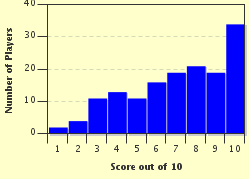Quiz Answer Key and Fun Facts
1. The quote in the title of this quiz has been attributed to Lincoln after the Battle of Shiloh. What other 'steely' name is this battle known by?
2. Prior to the Battle of Shiloh, Grant had led Union forces in three battles that demonstrated to Lincoln his willingness to engage the enemy. Of the four list below, which is NOT one of these battles?
3. After the Battle of Fort Donelson, Grant was given a nickname by the Northern press that would stick with him throughout the rest of the war. What did the press say the initials 'U.S.' stood for in Grant's name?
4. On July 3rd, 1863 the Battle of Gettysburg ended in the East. Which engagement in the West ended for Grant on July 4th, 1863?
5. Of the four choices below, which one is the geographic location where the decisive battle of the Chattanooga Campaign took place? (Hint: three of the geographic locations are from the Battle of Gettysburg, only one is from the Chattanooga Campaign)
6. When Grant assumed command of all Union Forces in 1864, he went East to face Lee. On May 4, 1864 he began what became known as the Overland Campaign. What was the first major battle in this campaign? (Hint: it reminds me of the Israelites when they left Egypt)
7. As Grant and the Union Army pushed further into Virginia during the Overland Campaign, where was the second place they met Lee's men in battle? (Hint: it sounds like a place Dick and Jane's dog would like)
8. The third battle in the Overland Campaign occurred at what river? (Hint: it reminds me of the musical "The King and I")
9. Which battle during the Overland Campaign was the bloodiest battle ever fought by Grant, and one of the bloodiest of the Civil War?
10. During the Siege of Petersburg, Grant ordered the tunneling under of the Confederates lines so as to blow them up. Who did the tunneling?
Source: Author
tazman6619
This quiz was reviewed by FunTrivia editor
bloomsby before going online.
Any errors found in FunTrivia content are routinely corrected through our feedback system.

